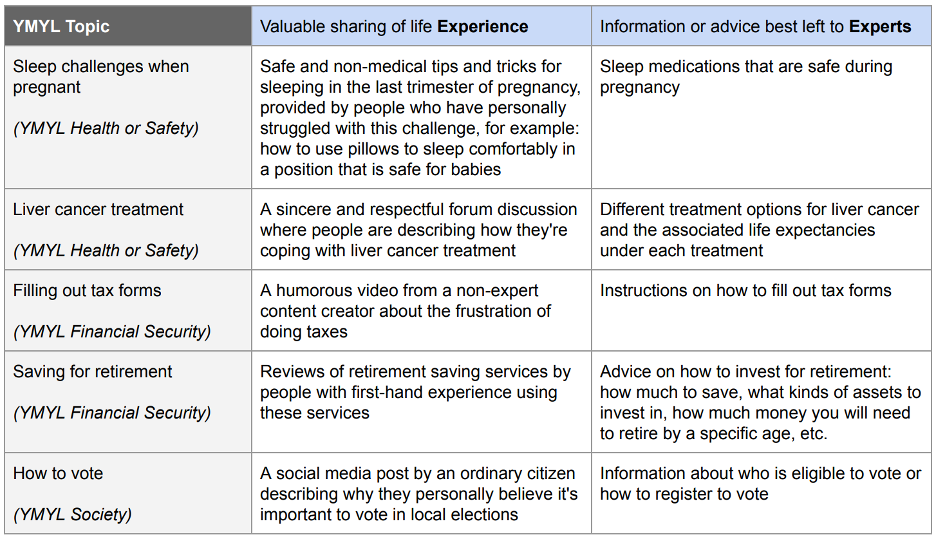How to optimize your wellness and health content for E-E-A-T
Wellness and nutrition brands must put a priority on content that demonstrates experience, expertise, authoritativeness, and trust (E-E-A-T).
As a YMYL or Your Money Your Life website, Google holds your website and content to higher standards than non-YMYL websites. Websites that sell products or provide services or information that can impact the happiness, health, financial stability, or safety of users are categorized by Google as YMYL.
Wellness, nutrition, health, and supplement websites are examples of YMYL sites. As the owner of such a website, you need to make sure your content and website meets Google’s expectations for quality, research, and authorship.
It is important as an YMYL site, your content clearly demonstrates E-E-A-T.
What is E-E-A-T?
E-E-A-T stands for experience, expertise, authoritativeness, and trust:
Experience:
You need to demonstrate that the author of your blogs, whitepapers, eBooks, etc. has first-hand or life experience about the topic.
Experience To Do’s: Include detailed author bios, links to other content, and credentials at the bottom of each blog or piece of content. If your author has personal experience with the topic, include this in the content using examples such as case studies, research, product experience, etc.
Expertise:
You need to demonstrate your expert skills or knowledge in the wellness, nutrition, health, or supplement domain.
Expertise To Do’s: Make your contact information easy to find. Include a link to your About Us and/or Contact Us page in either your main menu or footer navigation.
Authoritativeness:
You need to demonstrate that the person writing your content is an authority in your field and the content subject matter.
Authoritativeness To Do: Identify your authors with a byline and bio.
Trust:
Google measures your website trustworthiness by analyzing the quality of your backlinks.
Trust To Do’s: Focus on creating high-quality, well-researched content that other sites will want to link to or use as research sources. Use endnotes to reference supporting research and content.
What is YMYL?
YMYL stands for Your Money Your Life. Websites that sell products or provide services or information that can impact the happiness, health, financial stability, or safety of users are categorized by Google as YMYL.
Google categorizes the following websites as YMYL sites:
- News and current events
- Civics, government, and law
- Finance
- Shopping
- Health and safety
- Groups of people
- Other (fitness and nutrition, housing information, choosing a college, finding a job, etc.)
While Google expects all websites to have a beneficial purpose – it’s extra critical for wellness and nutrition websites to clearly prove the purpose or reason behind every page on the website.
Here is what Google says in section 2.3 of the Quality Rater Guidelines about YMYL sites:
Important: For pages about clear YMYL topics, we have very high Page Quality rating standards because low quality pages on such topics could potentially negatively impact a person’s health, financial stability, or safety, or the welfare or well-being of society.
And this table from Google explains experience and expertise in YMYL content:

How Wellness and Nutrition Brands can Optimize for E-E-A-T
Wellness and nutrition brands can optimize for E-E-A-T with these 9 steps:
1. Review your content for quality – make sure you can answer yes to these Google content and quality questions:
- Does the content provide original information, reporting, research or analysis?
- Does the content provide a substantial, complete or comprehensive description of the topic?
- If the content draws on other sources, does it avoid simply copying or rewriting those sources and instead provide substantial additional value and originality?
- Does the main heading or page title provide a descriptive, helpful summary of the comment?
- Does the main heading or page title avoid being exaggerating or shocking in nature?
2. Review your content for expertise – make sure you can answer yes to these Google expertise questions:
- Does the content present information in a way that makes you want to trust it, such as clear sourcing, evidence of the expertise involved, background about the author or the site that publishes it, such as through links to an author page or a site’s About page?
- If someone researched the site producing the content, would you come away with an impression that it is well-trusted or widely-recognized as an authority on its topic?
- Is this content written or reviewed by an expert or enthusiast who demonstrably knows the topic well?
3. Make sure it’s clear who wrote your content. Every single blog or article on your website needs an author bio.
Here is my bio, it clearly communicates experience, expertise, authoritativeness, and trust:
Jane Phelps is the CEO and co-founder of Know Agency, a specialist in organic search and paid search marketing expertise and leadership for health and wellness brands. Jane started Know Agency in 2010 focused solely on the nutritional supplement space. With her hands-on experience working in the health and wellness space, Jane is a public speaker and conference presenter at industry trade shows, networking events, and conferences on search and digital marketing strategies for wellness and nutrition brands.
4. Update your About Us Your About Us page should clearly explain what you do, why you do it, and why you’re qualified to do it.
Include reviews and testimonials from customers and clients.
5. Make it easy for people to contact you. Include your contact information, including email address and phone number in the footer of every page. Include a Contact Us link in your main menu.
6. Prove trust with endnotes or inline links to your research and content sources. Every statement about health, wellness, or nutrition needs to have a research reference.
This Pure For You blog, is a great example of how to use endnotes.
7. Audit your content for information quality and helpfulness. Remove filler content, pages with thin content, and misleading page titles and headings.
In section 7.0 of the Google Quality Rater guidelines, this sentence stands out:
High quality pages serve a beneficial purpose and achieve that purpose well. High quality pages exist for almost any beneficial purpose you can imagine, from providing information to selling products to making people laugh to artistic expression.
Use our Helpful Content Quality Checklists to make sure your content meets Google’s standards for content helpfulness, expertise, presentation, layout, and quality.
8. Refresh and update your content for search intent and keywords. Google likes to rank and trust content that is up-to-date and relevant.
Search intent is the problem, question, or query a person wants solved. This determines what they ask Google and the type of device they use to ask their questions. Create content that meets search intent – remember this can change based on the season, trends, and news cycle.
Read Your Complete Guide to Search Intent to learn how to optimize for search intent.
9. Create content hubs or topic clusters to demonstrate expertise. A content hub is a collection of blog posts about a specific topic.
This Ahrefs article explains how to create content hubs.
As a wellness or nutrition brand, your priority is on creating informative helpful content that demonstrates E-E-A-T.
Our team is here to help you with this. At Know Agency we specialize in organic search and paid search marketing expertise and leadership for health and wellness brands.
Contact Know Agency for professional advice you can count on.




